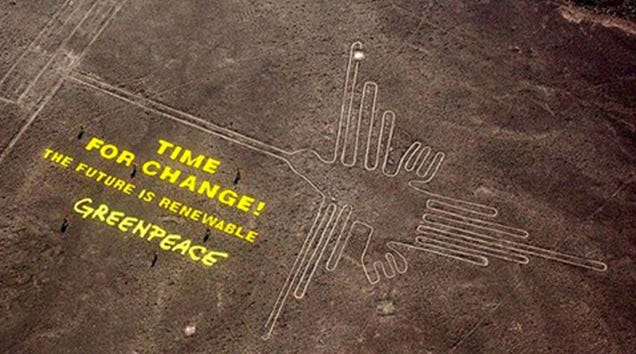By William Neuman
The Peruvian authorities said activists from the group damaged a patch of desert when they placed a large sign that promoted renewable energy near a set of lines that form the shape of a giant hummingbird.
The sign was meant to draw the attention of world leaders, reporters and others who were in Lima, the Peruvian capital, for a United Nations summit meeting aimed at reaching an agreement to address climate change. The meeting was scheduled to end Friday but negotiations were expected to continue into Saturday.
Greenpeace issued a statement apologizing for the stunt at the archaeological site, about 225 miles south of Lima. Its international executive director, Kumi Naidoo, flew to Lima, but the Peruvian authorities were seething over the episode, which they said had scarred one of the country’s most treasured national symbols.

This Greenpeace Stunt May Have Irreparably Damaged Peru's Nazca Site
By George Dvorsky
As The Guardian reports, the Nazca lines "are huge figures depicting living creatures, stylized plants and imaginary figures scratched on the surface of the ground between 1,500 and 2,000 years ago." The figures, which can only be seen from the air, are believed to have had ritual functions related to astronomy.
The ground around the site is so sensitive and so sacred that Peru has even forbidden presidents and top officials to walk where the Greenpeace activists went. Peru's Deputy Culture Minister told the BBC: "You walk there, and the footprint is going to last hundreds or thousands of years." Tourists generally get to see the site from the air, or, on rare occasions, are equipped with special foot gear.
"They are absolutely fragile. They are black rocks on a white background. You walk there and the footprint is going to last hundreds or thousands of years," said the minister. "And the line that they have destroyed is the most visible and most recognized of all."
Culture ministry says it will press charges against activists for damage to world heritage site as UN climate talks began in Lima
By Dan Collyns
A spokesman for Greenpeace said: “Without reservation Greenpeace apologises to the people of Peru for the offence caused by our recent activity laying a message of hope at the site of the historic Nazca lines. We are deeply sorry for this.
“Rather than relay an urgent message of hope and possibility to the leaders gathering at the Lima UN climate talks, we came across as careless and crass.”
Earlier Peru’s vice-minister for culture Luis Jaime Castillo had accused Greenpeace of “extreme environmentalism” and ignoring what the Peruvian people “consider to be sacred” after the protest at the world renowned Nazca lines, a Unesco world heritage site.
A tweet makes the problem plain:
Donna Yates @DrDonnaYates Dec 12
FYI: this is the damage done to the Nazca lines by Greenpeace. Not minor. Not in someone's opinion. Look at that.


No comments:
Post a Comment
Note: Only a member of this blog may post a comment.